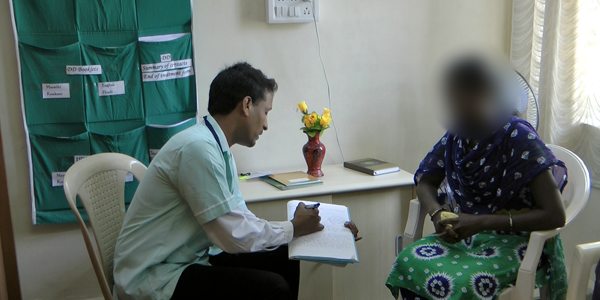
Subhash Pednekar worked in a call centre for some years but over time, he felt that he needed to change his profession. Today he has found his calling as a counsellor with Sangath, an NGO from Goa which works in the field of mental health care across many sites in India. There are many people like Subhash who work with Sangath as counsellors.
Sangath believes that one of the major barriers to accessing mental healthcare is a lack of specialists. Prof Vikram Patel, psychiatrist and co-founder of Sangath, gives a glimpse of the abysmally low number of mental health experts in India and why people like Pednekar are essential in creating a scalable mental healthcare delivery system. “For its population, India should have 1,50,000 psychiatrists to have the same proportion as the U.K., but the number is actually about 3,000, that is, 2% of that number. So I had to think out of the box—about some other model of care given the paucity of qualified psychiatrists and psychologists.”
This alternative model of care to bridge the treatment gap involves intensive training and supervision of lay people by specialists to work as mental health counsellors. Arpita Anand, a psychologist with the PREMIUM project in Sangath, says, “The counsellors don't have the training background that psychologists do. In the PREMIUM project we selected lay graduates through a rigorous process and provided them with intensive training and supervision to provide counselling treatments to people with depression and drinking problems in primary healthcare centres”
The beauty or ease of the programme lies in the fact that Sangath's counsellors work in collaboration with staff at the local primary health centres. Surabhi Soparkar (name changed for confidentiality) was suffering from depression when she went for a regular health check-up to the centre. Here she met the Sangath counsellor who gave her a new lease of life. “They spoke to me with such warmth and familiarity, it was like my mother was asking me how I was doing,” she says. “I got better in just seven sessions.”
Since the counsellors are from the same communities as the patients, it gives them an advantage as they understand the reality of their patients' lives. Subhash Pednekar talks about his very first patient with alcohol problems. “Before counselling started he would have a large amount to drink. By the second session he was having one-third of the amount and by the third session he had given up alcohol,” he says. “If the patients can't come to the health centres, we go to their homes or even counsel over the phone. Sometimes if the patient’s condition does not improve after a certain number of sessions, we refer them to a psychiatrist.”
“In the absence of trained mental health professionals, this task sharing of frontline mental healthcare tasks helps us to reach those people who would otherwise have never received any treatment for their mental health problems,” says Dr Abhijit Nadkarni, a psychiatrist with Sangath. Through its other projects Sangath has demonstrated scientifically that it is cost effective to use lay people from the community to counsel patients with depression, schizophrenia and dementia.
Maybe it is time to scale up the programme in size, and as recognition of this effective model India’s new mental health policy recommends that primary healthcare centres across India should have a cadre of counsellors at the frontline of mental healthcare delivery.
To know more about the work of Sangath, click here.